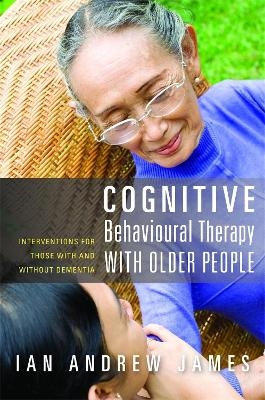
Cognitive Behavioural Therapy with Older People
Jessica Kingsley Publishers (Verlag)
978-1-84905-100-2 (ISBN)
The development of 'ageless' mental health services means that an increasing number of clinicians are now required to work with older people. Cognitive Behavioural Therapy is recognised by all recent meta-analyses as the most effective therapy, yet few clinicians are trained specifically in its usage with the elderly.
This book is a detailed guide to using CBT with older people both with and without cognitive difficulties. Reviewing its use in different settings, it covers both conceptual and practical perspectives, and details everything from causes and initial assessment to case formulation and change techniques. Case studies in both depression and dementia are used to illustrate how CBT should work and how positive effects can manifest themselves.
Suitable both for trainees and experienced therapists, this book will be essential for anybody using cognitive behavioural therapy in their work with older people, regardless of their clients' levels of cognitive ability.
Ian Andrew James is Head of Newcastle Challenging Behaviour Service and Consultant Clinical Psychologist for Northumberland Tyne and Wear NHS Trust. Having graduated in Psychology from the University of Aberdeen, he undertook a PhD in cognitive psychology at Lancaster University. After completing his clinical training at Newcastle University, he spent four years at Newcastle Cognitive and Behavioural Therapies Centre, undertaking work on therapeutic competence. Ian Andrew James has published extensively in the field of mental health, training and clinical supervision, and is a regular speaker at national and international conferences. He is a lecturer on the Clinical Psychology course at Newcastle University, and now focuses on applying therapy to people with dementia.
Chapter 1. 1.1 Introduction. 1.2 Partitioning - parts 1 to 3. Part 1. Chapter 2. Patients' Presentations and How CBT Helps. 2.1 Introduction. 2.2 Nature of the mood disorders. 2.3 Nature of standard CBT. 2.4 Working with people in non-standard CBT formats. 2.5 Conclusion. Chapter 3. Adapting Therapy for Older People. 3.1 Introduction. 3.2 Two dimensional framework for categorising presentations. 3.3 Conclusion. Chapter 4. Cognitive Changes, Executive Functioning, Working Memory and Scripts: Their Relevance to Therapeutic Engagement. 4.1 Introduction. 4.2 Cognitive changes. 4.3 Executive functioning. 4.4 Working memory. 4.5 Actions of scripts. 4.6 Conclusion. Part 2. Chapter 5. Assessment. 5.1 Introduction. 5.2 Assessment protocol. 5.3 Cautions regarding the assessment process. 5.4 Measures. 5.5 Conclusion. Chapter 6. Case Formulation. 6.1 Introduction. 6.2 Nature of formulations. 6.3 Formulations with older people. 6.4 Review of formulation approaches used with older people. 6.5 Choice of formulation. 6.6 Cautions regarding use of formulations. 6.7 Conclusion. Chapter 7 Change Techniques. 7.1 Introduction. 7.2 Nature of change. 7.3 Change strategies. 7.4 Process issues associated with change techniques. 7.5 Modifying core beliefs. 7.6 Cognitive change with the continuum technique. 7.7 Conclusion. Part 3. Chapter 8 A Case Study in Depression: Mary. 8.1 Introduction. 8.2 Overview of the case. 8.3 Review of the work undertaken with Mary. 8.4 Conclusion. Chapter 9 Assessing and Developing Clinical Competence. 9.1 Introduction. 9.2 The Cognitive Therapy Scale-Revised. 9.3 Conclusion. Chapter 10. Use of Psychotherapy in the Treatment of Challenging Behaviours in Care Facilities: A Staff-Centred, Person-Focused Approach. 10.1 Introduction. 10.2 Description of the NCBS and its treatment philosophy. 10.3 Overview of the case. 10.4 Protocol of the Newcastle approach. 10.5 Process and structural features of the assessment phase. 10.6 Information Sharing Session (ISS) and goal-setting process. 10.7 Formulation. 10.8 Treatment and outcome. 10.9 Reflections. Chapter 11.Concluding Comments 11.1 Introduction. 11.2 Working with carers. 11.3 Alternative models to CBT in the treatment of depression. 11.4 IAPT: Provision of Mental Health Services for Older People. 11.5 Concluding comments and reflections. Appendix 1: Disorder-specific conceptual models. Appendix 2: A training manual for promoting therapeutic competence. References.
| Erscheint lt. Verlag | 15.5.2010 |
|---|---|
| Verlagsort | London |
| Sprache | englisch |
| Maße | 150 x 228 mm |
| Gewicht | 382 g |
| Themenwelt | Medizin / Pharmazie ► Medizinische Fachgebiete ► Geriatrie |
| Medizin / Pharmazie ► Medizinische Fachgebiete ► Psychiatrie / Psychotherapie | |
| ISBN-10 | 1-84905-100-3 / 1849051003 |
| ISBN-13 | 978-1-84905-100-2 / 9781849051002 |
| Zustand | Neuware |
| Haben Sie eine Frage zum Produkt? |
aus dem Bereich


